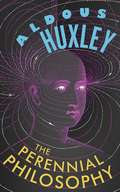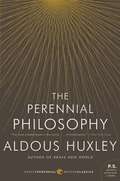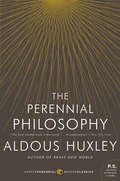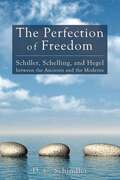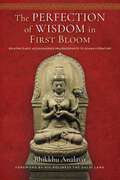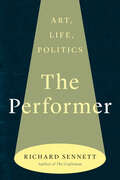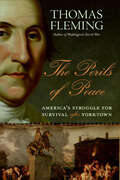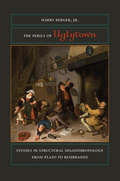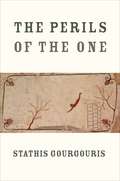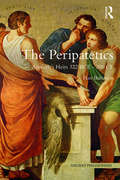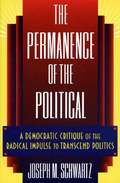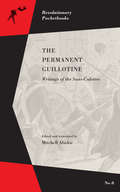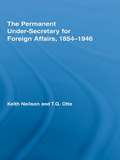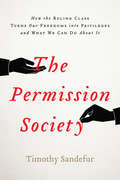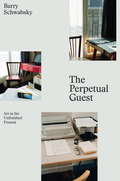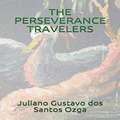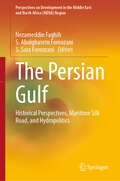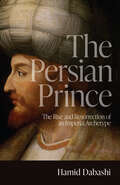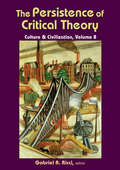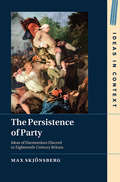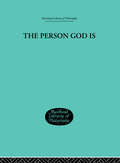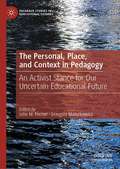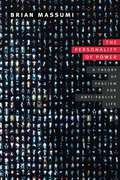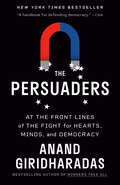- Table View
- List View
The Perennial Philosophy: An Interpretation Of The Great Mystics, East And West (P. S. Ser.)
by Aldous HuxleyThe Perennial Philosophy is defined by its author as "The metaphysic that recognizes a divine Reality substantial to the world of things and lives and minds. " With great wit and stunning intellect, Aldous Huxley examines the spiritual beliefs of various religious traditions and explains them in terms that are personally meaningful.
The Perennial Philosophy: An Interpretation of the Great Mystics, East and West
by Aldous HuxleyAn inspired gathering of religious writings that reveals the "divine reality" common to all faiths, collected by Aldous Huxley "The Perennial Philosophy," Aldous Huxley writes, "may be found among the traditional lore of peoples in every region of the world, and in its fully developed forms it has a place in every one of the higher religions. " With great wit and stunning intellect-drawing on a diverse array of faiths, including Zen Buddhism, Hinduism, Taoism, Christian mysticism, and Islam-Huxley examines the spiritual beliefs of various religious traditions and explains how they are united by a common human yearning to experience the divine. The Perennial Philosophy includes selections from Meister Eckhart, Rumi, and Lao Tzu, as well as the Bhagavad Gita, Tibetan Book of the Dead, Diamond Sutra, and Upanishads, among many others.
The Perennial Philosophy: An Interpretation of the Great Mystics, East and West (P. S. Ser.)
by Aldous HuxleyAn inspired gathering of religious writings that reveals the "divine reality" common to all faiths, collected by Aldous Huxley"The Perennial Philosophy," Aldous Huxley writes, "may be found among the traditional lore of peoples in every region of the world, and in its fully developed forms it has a place in every one of the higher religions." With great wit and stunning intellect--drawing on a diverse array of faiths, including Zen Buddhism, Hinduism, Taoism, Christian mysticism, and Islam--Huxley examines the spiritual beliefs of various religious traditions and explains how they are united by a common human yearning to experience the divine. The Perennial Philosophy includes selections from Meister Eckhart, Rumi, and Lao Tzu, as well as the Bhagavad Gita, Tibetan Book of the Dead, Diamond Sutra, and Upanishads, among many others.
The Perfect Wave
by Heinrich PasAlmost weightless and able to pass through the densest materials with ease, neutrinos seem to defy the laws of nature. But these mysterious particles may hold the key to our deepest questions about the universe, says physicist Heinrich Pas. In "The Perfect Wave," Pas serves as our fluent, deeply knowledgeable guide to a particle world that tests the boundaries of space, time, and human knowledge. The existence of the neutrino was first proposed in 1930, but decades passed before one was detected. Pas animates the philosophical and scientific developments that led to and have followed from this seminal discovery, ranging from familiar topics of relativity and quantum mechanics to more speculative theories about dark energy and supersymmetry. Many cutting-edge topics in neutrino research--conjectures about the origin of matter, extra-dimensional spacetime, and the possibility of time travel--remain unproven. But Pas describes the ambitious projects under way that may confirm them, including accelerator experiments at CERN and Fermilab, huge subterranean telescopes designed to detect high-energy neutrino radiation, and the Planck space observatory scheduled to investigate the role of neutrinos in cosmic evolution. As Pass history of the neutrino illustrates, what is now established fact often sounded wildly implausible and unnatural when first proposed. The radical side of physics is both an exciting and an essential part of scientific progress, and "The Perfect Wave" renders it accessible to the interested reader.
The Perfection of Freedom: Schiller, Schelling, and Hegel Between The Ancients and the Moderns (Veritas Series #Number Eight)
by D. C. SchindlerThe Perfection of Freedom seeks to respond to the impoverished conventional notion of freedom through a recovery of an understanding rich with possibilities yet all but forgotten in contemporary thought. This understanding, developed in different but complementary ways in the German thinkers Schiller, Schelling, and Hegel, connects freedom, not exclusively with power and possibility, but rather most fundamentally with completion, wholeness, and actuality. What is unique here is specifically the interpretation of freedom in terms of form, whether it be aesthetic form (Schiller), organic form (Schelling), or social form (Hegel). <p><p>Although this book presents serious criticisms of the three philosophers, it shows that they open up new avenues for reflection on the notion of freedom; avenues that promise to overcome many of the dichotomies that continue to haunt contemporary thought--for example, between freedom and order, freedom and nature, and self and other. The Perfection of Freedom offers not only a significantly new interpretation of Schiller, Schelling, and Hegel, it also proposes a modernity more organically rooted in the ancient and classical Christian worlds.
The Perfection of Wisdom in First Bloom: Relating Early Astasahasrika Prajnaparamita to Agama Literature
by Bhikkhu AnalayoSee the formative years of Mahayana Buddhist literature through the lens of the Perfection of Wisdom, expertly analyzed by the venerable scholar-monk Bhikkhu Analayo.In this work we have a rare perspective on the early history of Mahayana Buddhism and the Perfection of Wisdom (Prajnaparamita), as far as this is still accessible in surviving texts. With his characteristic clarity and precision, Bhikkhu Analayo critically analyzes early Perfection of Wisdom literature based on the earliest extant versions of the Astasahasrika Prajnaparamita, or the Perfection of Wisdom in Eight Thousand Lines, one in Chinese and the other in Gandhari—one of the oldest surviving Mahayana manuscripts discovered to date. In reading this text from the viewpoint of early Buddhist literature, the author shows that what has generally been considered a sharp rupture in the formation of the Mahayana turns out to be more of a gradual evolution. With his command of the languages of the ancient Buddhist world, scholar-monk Bhikkhu Analayo sifts through the layers of history and unveils new perspectives on the ideas and figures in early Perfection of Wisdom and Mahayana literature, covering such topics as the rhetoric of emptiness and the emerging bodhisattva ideal, as well as the status of women and the practice of self-immolation. In doing so, Bhikkhu Analayo reveals fresh insights into the gradual development that informs the emergence of early Perfection of Wisdom literature. This is a rare opportunity to peer through a window at the beginnings of Mahayana thought—before the traditions had coalesced into the familiar forms we see today.
The Performer: Art, Life, Politics
by Richard SennettAn acclaimed sociologist&’s exploration of the connections among performances in life, art, and politics In The Performer, Richard Sennett explores the relations between performing in art (particularly music), politics, and everyday experience. It focuses on the bodily and physical dimensions of performing, rather than on words. Sennett is particularly attuned to the ways in which the rituals of ordinary life are performances. The book draws on history and sociology, and more personally on the author&’s early career as a professional cellist, as well as on his later work as a city planner and social thinker. It traces the evolution of performing spaces in the city; the emergence of actors, musicians, and dancers as independent artists; the inequality between performer and spectator; the uneasy relations between artistic creation and social and religious ritual; the uses and abuses of acting by politicians. The Janus-faced art of performing is both destructive and civilizing.
The Perils of Peace: America's Struggle for Survival After Yorktown
by Thomas FlemingThe acclaimed historian presents a “captivating account of a surprisingly little-known period” at the close of the American Revolution (Kirkus, starred review).On October 19, 1781, Great Britain’s best army surrendered to General George Washington at Yorktown. But the future of the thirteen former colonies was far from clear. 13,000 British troops still occupied New York City, and another 13,000 regulars and armed loyalists were scattered from Canada to Georgia. Meanwhile, the American army had not been paid for years and was on the brink of mutiny.In Europe, America’s only ally, France, teetered on the verge of bankruptcy and was soon reeling from a disastrous naval defeat in the Caribbean. A stubborn George III dismissed Yorktown as a minor defeat and refused to yield an acre of “my dominions” in America. In Paris, Ambassador Benjamin Franklin confronted violent hostility toward France among his fellow members of the American peace delegation.In The Perils of Peace, Thomas Fleming moves between the key players in this drama and shows that the outcome we take for granted was far from certain. With fresh research and masterful storytelling, Fleming breathes new life into this tumultuous but little known period in America’s history.
The Perils of Uglytown: Studies in Structural Misanthropology from Plato to Rembrandt
by Harry BergerWith characteristic wit, Harry Berger, Jr., brings his flair for close reading to texts and images across two millennia that illustrate what he calls “structural misanthropology.” Beginning with a novel reading of Plato, Berger emphasizes Socrates’s self-acknowledged failures. The dialogues, he shows, offer up, only to dispute, a misanthropic polis. The Athenian city-state, they worry, is founded on a social order motivated by apprehension—both the desire to take and the fear of being taken. In addition to suggesting new politicaland philosophical dimensions to Platonic thought, Berger’s attention to rhetorical practice offers novel ways of parsing the dialogic method itself. In the book’s second half, Berger revisits and revises his earlier accounts of Italian humanism, Elizabethan drama, and Dutch painting. Berger shows how structural misanthropology helps us to read the competitive practices that characterize Renaissance writing and art, whether in Machiavelli’s constitutional prostheses, Shakespeare’s pageants of humiliation, or the elbow jabs of Dutch portraiture.
The Perils of the One
by Stathis GourgourisFrom the earliest times, societies have been seduced by the temptation of unitary thinking. Recognizing the vulnerability of existence, people and cultures privilege regimes that confer authority on a single entity, a sovereign ruler, a transcendental deity, or an Event, which they embrace with unquestioned devotion. Such obsessions precipitate contempt for the worldliness of real bodies in real time and refusal of responsibility and agency.In The Perils of the One, Stathis Gourgouris offers a philosophical anthropology that confronts the legacy of “monarchical thinking”: the desire to subjugate oneself to unitary principles and structures, whether political, moral, theological, or secular. In wide-ranging essays that are at once poetic and polemical, intellectual and passionate, Gourgouris reads across politics and theology, literary and art criticism, psychoanalysis and feminism in a critique of both political theology and the metaphysics of secularism. He engages with a range of figures from the Apostle Paul and Trinitarian theologians, to La Boétie, Schmitt, and Freud, to contemporary thinkers such as Clastres, Said, Castoriadis, Žižek, Butler, and Irigaray. At once a broad perspective on human history and a detailed examination of our present moment, The Perils of the One offers glimpses of what a counterpolitics of autonomy would look like from anarchic subjectivities that refuse external ideals, resist the allure of command and obedience, and embrace otherness.
The Peripatetics: Aristotle's Heirs 322 BCE - 200 CE (Ancient Philosophies)
by Han BaltussenThe Peripatetics explores the development of Peripatetic thought from Theophrastus and Strato to the work of the commentator Alexander of Aphrodisias. The book examines whether the internal dynamics of this philosophical school allowed for a unity of Peripatetic thought, or whether there was a fundamental tension between philosophical creativity and the notions of core teachings and canonisation. The book discusses the major philosophical preoccupations of the Peripatetics, interactions with Hellenistic schools of thought, and the shift in focus among Greek philosophers in a changing political landscape. It is the first book of its kind to provide a survey of this important philosophical tradition.
The Permanence of the Political: A Democratic Critique of the Radical Impulse to Transcend Politics
by Joseph M. SchwartzWhy have radical political theorists, whose thinking inspired mass movements for democracy, been so suspicious of political plurality? According to Joseph Schwartz, their doubts were involved with an effort to transcend politics. Mistakenly equating all social difference with the harmful way in which particular interests dominated marketplace societies, radical thinkers sought a comprehensive set of "true human interests" that would completely abolish political strife. In extensive analyses of Rousseau, Hegel, Marx, Lenin, and Arendt, Schwartz seeks to mediate the radical critique of democratic capitalist societies with the concern for pluralism evidenced in both liberal and postmodern thought. He thus escapes the authoritarian potential of the radical position, while appropriating its more democratic implications.In Schwartz's view, a reconstructed radical democratic theory of politics must sustain liberalism's defense of individual rights and social pluralism, while redressing the liberal failure to question structural inequalities. In proposing such a theory, he criticizes communitarianism for its premodern longing for a monolithic, virtuous society, and challenges the "politics of difference" for its failure to question the undemocratic terrain of power on which "difference" is constructed. In conclusion, he maintains that an equitable distribution of power and resources among social groups necessitates not the transcendence of politics but its democratic expansion.
The Permanent Guillotine: Writings of the Sans-Culottes (Revolutionary Pocketbooks)
by Mitchell AbidorWhen the Bastille was stormed on July 14, 1789, it wasn't a crowd of breeches-wearing professionals that attacked the prison, it was the working people of Paris. The Permanent Guillotine is an anthology of figures who expressed the will and wishes of this nascent revolutionary class, in all its rage, directness, and contradictoriness.
The Permanent Under-Secretary for Foreign Affairs, 1854-1946 (British Politics and Society)
by Keith Neilson T.G. OtteChief among the personnel at the Foreign Office is the Permanent Under-secretary, the senior civil servant who oversees the department and advises the Foreign Secretary. This book is a study of the twelve men who held this Office from 1854–1946.
The Permission Society: How the Ruling Class Turns Our Freedoms into Privileges and What We Can Do About It
by Timothy SandefurThroughout history, kings and emperors have promised "freedoms" to their people. Yet these freedoms were really only permissions handed down from on high. The American Revolution inaugurated a new vision: people have basic rights to life, liberty, and the pursuit of happiness, and government must ask permission from them. Sadly, today's increasingly bureaucratic society is beginning to turn back the clock and to transform America into a nation where our freedoms-the right to speak freely, to earn a living, to own a gun, to use private property, even the right to take medicine to save one's own life-are again treated as privileges the government may grant or withhold at will. Timothy Sandefur examines the history of the distinction between rights and privileges that played such an important role in the American experiment, and how we can fight to retain our freedoms against the growing power of government. Illustrated with dozens of real-life examples-including many cases he litigated himself-Sandefur shows how treating freedoms as government-created privileges undermines our Constitution and betrays the basic principles of human dignity.
The Perpetual Guest
by Barry SchwabskyLeading art critic explores the connections between art's past and presentThe idea of contemporary art sometimes allows us to pretend we have made a clean break with the past. In The Perpetual Guest, poet and critic Barry Schwabsky demonstrates that any robust understanding of art's present must also account for the ongoing life and changing fortunes of its past.In surveying the art world of this past decade, Schwabsky attends not only to its most significant newer faces--among them, Kara Walker, Thomas Hirschhorn, Ai Weiwei, Chris Ofili, and Lorna Simpson--but their forebears, both recent (Jeff Wall, Nancy Spero, Dan Graham, Cindy Sherman) and more distant (Velázquez, Manet, Matisse, and the portraitists of the Renaissance)."The art critic," Schwabsky writes, "formalizes and deliberately exemplifes the role of the spectator who realizes the artist's work, not by leaving it just as it is, but by adding something to it, making a personal contribution."Despite the hysterical pronouncements of criticism's demise, Schwabsky's rich and subtle considerations of art's complexly intertwined traditions are an indispensable contribution to understanding our present moment.From the Trade Paperback edition.
The Perseverance Travelers
by Juliano OzgaThe Birth Of The “Fire Salamander” (0-7 Years) The Turbulent Childhood Of Young Alf Naftali Kalil (8-14 Years) The Way To The Fire Work: Becoming a Manual Glass Master's Apprentice (15-21 Years) The Beginning Of Men's Trial And The Schooling Away From Home: Manual Glass Master (22-28 Years) The Practical Work Of Fire: The Marriage With Teresa Paula Isadora (29-35 Years) The Fire Salamander's Daughter: Augusta Rebeca Jade (36-42 Years) The Fight Against Adversity: Raising a Daughter (43-49 Years) The End Of The Hard Work To Survive (50-56 Years) The Beginning Of The Journey Of Perseverance Travelers (57-63 Years) The Water Initiation (64-70 Years) The Earth Initiation (71-77 Years) The Air Initiation (78-84 Years)
The Persian Gulf: Historical Perspectives, Maritime Silk Road, and Hydropolitics (Perspectives on Development in the Middle East and North Africa (MENA) Region)
by Nezameddin Faghih S. Abolghasem Foroozani S. Sara ForoozaniThis edited volume provides a comprehensive exploration of the Persian Gulf, covering historical naming and trade relationships, political and military strategies, and the impact of tribal systems on regional security. It spans from the Sassanid period to modern times, examining the role of the Maritime Silk Road and the strategic importance of water resources. Through contributions from various experts, the book offers a multi-dimensional view of the Persian Gulf, making it an essential resource for scholars and students interested in the region's complex dynamics.
The Persian Prince: The Rise and Resurrection of an Imperial Archetype
by Hamid DabashiWith its title borrowed from Machiavelli, The Persian Prince goes far beyond Machiavelli's wildest imagination as to how to rule the world. Hamid Dabashi articulates a bold new idea of the Persian Prince—a metaphor of political authority, a figurative ideal deeply rooted in the collective memories of multiple nations, and a literary construct that connected Muslim empires across time and space and continues to inform political debate today. Drawing on works from Classical Antiquity and the vast Persianate worlds from India to the Mediterranean, as well as the Hebrew Bible and European medieval mirrors for princes, Dabashi engages a diverse body of political thought to reveal the construction of the Persian Prince as a potent archetype. He traces this archetype through its varied historic gestations and finds it resurfacing in postcolonial political thought as a rebel, a prophet, a poet, and a nomad. Bringing poetics and politics together, Dabashi shows how this archetypal figure has long defined political authority throughout the wider Iranian and Islamic worlds. With meticulous attention to literary and poetic texts, moral and philosophical treatises, allegorical and anecdotal stories, sacred and secular evidence, visual and performing arts, histories of global empires and colonial conquests, this sweeping work offers a deeply learned, richly erudite, and transformative piece of critical thinking. As Dabashi shows, the Persian Prince remains the stuff of current debate across the Muslim and Persianate worlds, in contestations over the public domain and the collective will to power, and above all in the prospects of democratic institutions.
The Persistence of Critical Theory: Culture And Civilization (Culture and Civilization)
by Gabriel R. RicciThe latest volume of Culture and Civilization gathers contemporary exponents of critical theory, specifically those based in the Frankfurt School of social thinking. Collectively, this volume demonstrates the continuing intellectual viability of critical theory, which challenges the limits of positivism and materialism. We may question how the theoretical framework of Marxism fails to coordinate with the conditions that defined labor forces, as did Max Horkheimer and Theodor Adorno, or deliberate on the conditions that justify the claims we make through public discourse, as did Jurgen Habermas. Or, like Axel Honneth, we may reflect on recognition theory as a means of addressing social problems. Whatever our objective, the focus of critical theory continues to be the consciousness of established "positive" interests that, without debate, may sustain injustices or conditions which the public may not have chosen to impose. Throughout the hardship of punitive dismissal and exile in the 1930s and 40s, and the shock of the New Left in the 1960s and 70s, and finally the later linguistic and pragmatic turn, the Frankfurt School has sustained the idea that people escape disaffection and alienation when their knowledge of the social and political world is dialectically mediated through creative interaction. This new volume in the Culture and Civilization series continues the tradition of critical thought.
The Persistence of Party: Ideas of Harmonious Discord in Eighteenth-Century Britain (Ideas in Context)
by Max SkjönsbergPolitical parties are taken for granted today, but how was the idea of party viewed in the eighteenth century, when core components of modern, representative politics were trialled? From Bolingbroke to Burke, political thinkers regarded party as a fundamental concept of politics, especially in the parliamentary system of Great Britain. The paradox of party was best formulated by David Hume: while parties often threatened the total dissolution of the government, they were also the source of life and vigour in modern politics. In the eighteenth century, party was usually understood as a set of flexible and evolving principles, associated with names and traditions, which categorised and managed political actors, voters, and commentators. Max Skjönsberg thus demonstrates that the idea of party as ideological unity is not purely a nineteenth- or twentieth-century phenomenon but can be traced to the eighteenth century.
The Person God Is
by Bertocci, Peter AFirst published in 2002. Routledge is an imprint of Taylor & Francis, an informa company.
The Personal, Place, and Context in Pedagogy: An Activist Stance for Our Uncertain Educational Future (Palgrave Studies in Educational Futures)
by Grzegorz Mazurkiewicz John M. FischerThis edited volume includes contributions on education within a world of challenges by authors with diverse experiences and perspectives. Together, the authors reflect on educational initiatives and life in democratic societies, arguing for an increased awareness of the educational processes at work within our contexts, places, and personal lives. Chapters argue that authority and knowledge belong to everyone and that these are found on every level of perceived educational hierarchies. This book calls for attention to be paid to the voices of teachers in school, students in the classroom, participants in a project, and researchers embedded in a community—highlighting that they all have something to teach about understanding the world all are working to create in an uncertain educational future.
The Personality of Power: A Theory of Fascism for Anti-fascist Life (Thought in the Act)
by Brian Massumi“I am the Chosen One!” With this exclamation Donald Trump crowns the national exceptionalism his base upholds with a claim of personal exceptionalism. He leaves no doubt as to the emotional note: “I am your vengeance!” He personifies reaction for the masses. Except, in today’s microsegmented social media environment the “masses” no longer exist. Fascism’s cultural conditions have shifted. In The Personality of Power, Brian Massumi retheorizes the conditions of contemporary fascism through the prism of Trump’s persona. Older theories based on identification of the masses with a charismatic leader no longer hold. Rather, an affective regime of reaction agitates bodies and orients lives at the molecular level. Massumi examines this agitation in relation to race, gender, personhood, and conspiracy thinking. The Personality of Power is a political treatise on fascism and its precursor movements, coupled with a philosophical inquiry into becoming reactionary as a collective process. Massumi calls the very concept of the person into question, asking what collective personhood means concretely. Nothing less than an alternative political logic is needed, turned to the task of thinking collective individuation.
The Persuaders: At the Front Lines of the Fight for Hearts, Minds, and Democracy
by Anand GiridharadasNEW YORK TIMES BESTSELLER • An insider account of activists, politicians, educators, and everyday citizens working to change minds, bridge divisions, and fight for democracy—from disinformation fighters to a leader of Black Lives Matter to Bernie Sanders and Alexandria Ocasio-Cortez and more—by the best-selling author of Winners Take All and award-winning former New York Times columnist&“Anand Giridharadas shows the way we get real progressive change in America—by refusing to write others off, building more welcoming movements, and rededicating ourselves to the work of changing minds.&” —Robert B. Reich, best-selling author of The SystemThe lifeblood of any free society is persuasion: changing other people&’s minds in order to change things. But America is suffering a crisis of faith in persuasion that is putting its democracy and the planet itself at risk. Americans increasingly write one another off instead of seeking to win one another over. Debates are framed in moralistic terms, with enemies battling the righteous. Movements for justice build barriers to entry, instead of on-ramps. Political parties focus on mobilizing the faithful rather than wooing the skeptical. And leaders who seek to forge coalitions are labeled sellouts.In The Persuaders, Anand Giridharadas takes us inside these movements and battles, seeking out the dissenters who continue to champion persuasion in an age of polarization. We meet a leader of Black Lives Matter; a trailblazer in the feminist resistance to Trumpism; white parents at a seminar on raising adopted children of color; Bernie Sanders and Alexandria Ocasio-Cortez; a team of door knockers with an uncanny formula for changing minds on immigration; an ex-cult member turned QAnon deprogrammer; and, hovering menacingly offstage, Russian operatives clandestinely stoking Americans&’ fatalism about one another.As the book&’s subjects grapple with how to call out threats and injustices while calling in those who don&’t agree with them but just might one day, they point a way to healing, and changing, a fracturing country.
